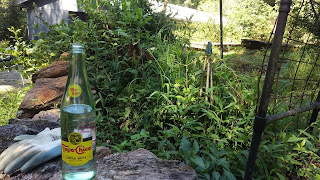Vanessa Blakeslee
Winter Park, Florida
July 2017
Rest and Rekindling
On my first day weeding in the tomato beds, I made sure to be on constant lookout for snakes. I dislike snakes and always have, and South Carolina, is, after all, rattlesnake and copperhead country. But, turns out what struck and caused my hand to swell for five days was my upsetting a wasps’ nest—two sharply painful stings. Moral of the story is: don’t get too fixated on a suspected threat, because you might just overlook what is right in front of you. This was my first residency where I’d signed on for work exchange, and I have wanted to get more hands-on experience with gardening for a long time. What was the experience of taking on tasks in new surroundings, plus accomplishing my own writing, going to be like?
While I took Benadryl and iced my hand, I wasn’t in optimal shape to write, especially to rethink the novel project I’d come here with or to revise the stories for my forthcoming collection. Was something telling me to first rest and reflect? Let go and roll with the punches, I told myself, and set off to explore. First the library, where I stumbled across several books that I’d been curious about for a while. I felt an urgent need to reconnect more deeply with myself, to grieve and finally accept the state of our planet as climate chaos and mass extinction unfolds, and I found the space to do that in my studio at Rensing.
Several times I brought along a book, hiked the path to the waterfall, and enjoyed the cooler temperatures at trail’s end. What better place to read The Hidden Life of Trees? Walking back, I looked at the mosses, fungi, and stumps anew, my view of the interconnected ecosystem transformed.
The swelling in my hand subsided, and I carried on tending to “The Secret Garden,” as I dubbed the well-laid but overgrown upper garden. The scent of ripening tomatoes mixed with earth refreshed my senses, and soon enough, after a few mornings of gardening, I returned to my studio, washed up, and felt the creative urge reawaken. Sometimes I worked at my desk, but more often, and when the temperatures cooled off enough, I wrote on my back porch. And kept reading: The Way of the Shaman by Michael Harner, Gratitude by Oliver Sacks, Morningstar by Ann Hood. One day a fairly large creature crushed branches below; I crept over to the screen. A deer picked her way through the underbrush, eating leaves. I look up from my laptop and the cardinal and his mate fly from tree to tree. Late afternoon and into the night, the bullfrogs groan. We may not resemble one another, but we are all cousins—trees, birds, insects. Our DNA is more related than not; we emerged from stardust.
Here I revisited an older story of mine that I very much liked, drafted a new dystopian fiction and expanded another piece started earlier this year. Upon these pages you’ll find images of Rensing, from the Foxfire book on my shelf to the goats in the pasture. I have been struggling for much of this year with how to make art in a world that appears every day more ugly and insane—writing takes time to shape, even longer to publish and find its audience. Is there even a point? A visit to the nearby petroglyphs reminded me that humans have been making art for as long as we have been gathered around a fire in the wilderness, surrounded by many different threats, and will continue to do so. We make art because we are terrified and enthralled by the grand cosmic mystery, and because out of our lives we must make beauty, justice, and meaning. All we ever have is this moment.
There will be green beans, tomatoes, and figs to be gathered this week, and more weeds to be pulled, wasps to look out for, and snakes. There will be thunderstorms, rousing breezes. There will be conversation, cherry cobbler, and laughter. From my porch the sunlight strikes the leaves, bright green, and a blue butterfly dances. What else might make its imprint on my fiction, now, and after I leave? I’m ever grateful to the Rensing Center for the solitude, contemplation, and reconnection I’ve found here.









